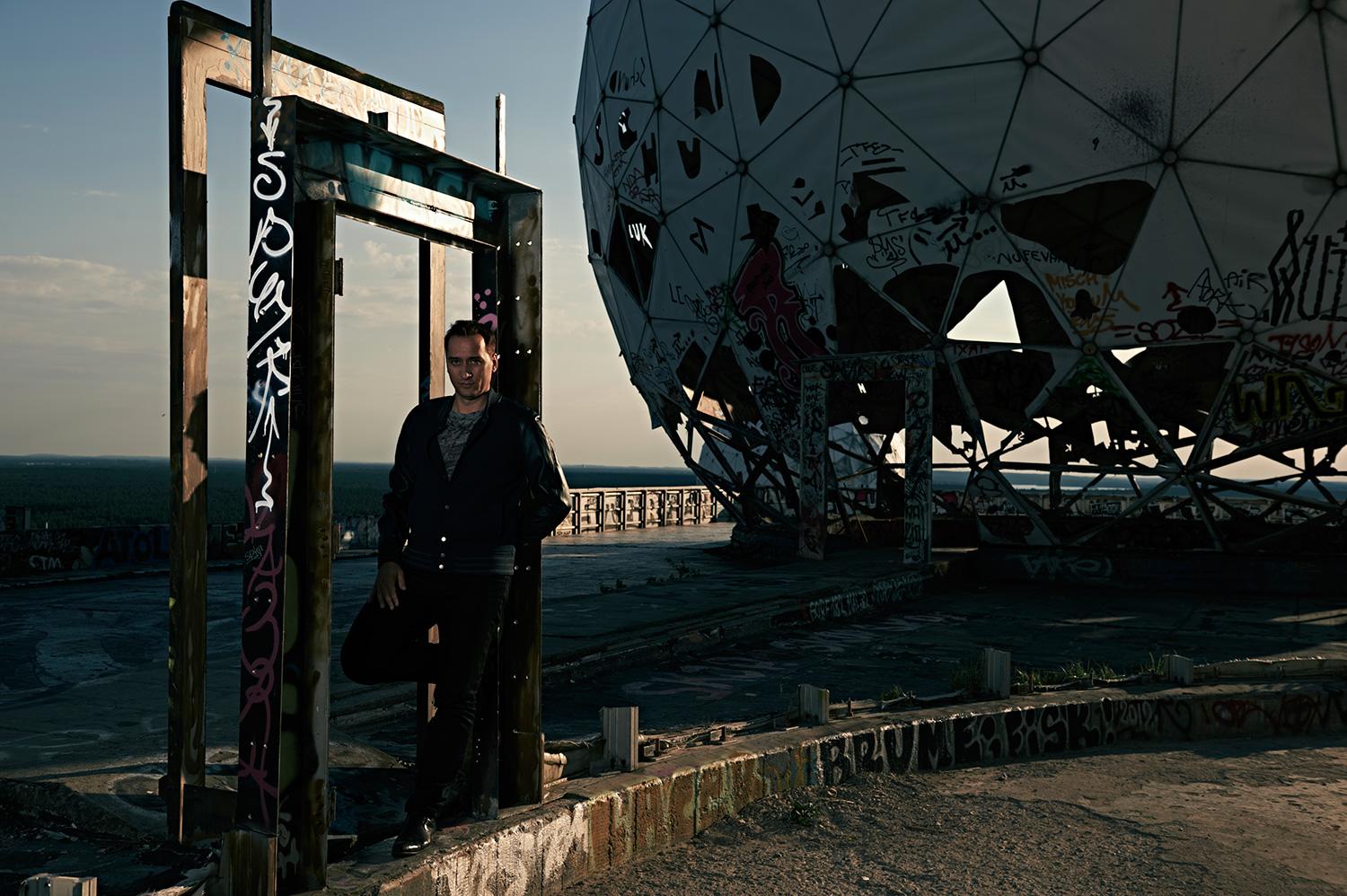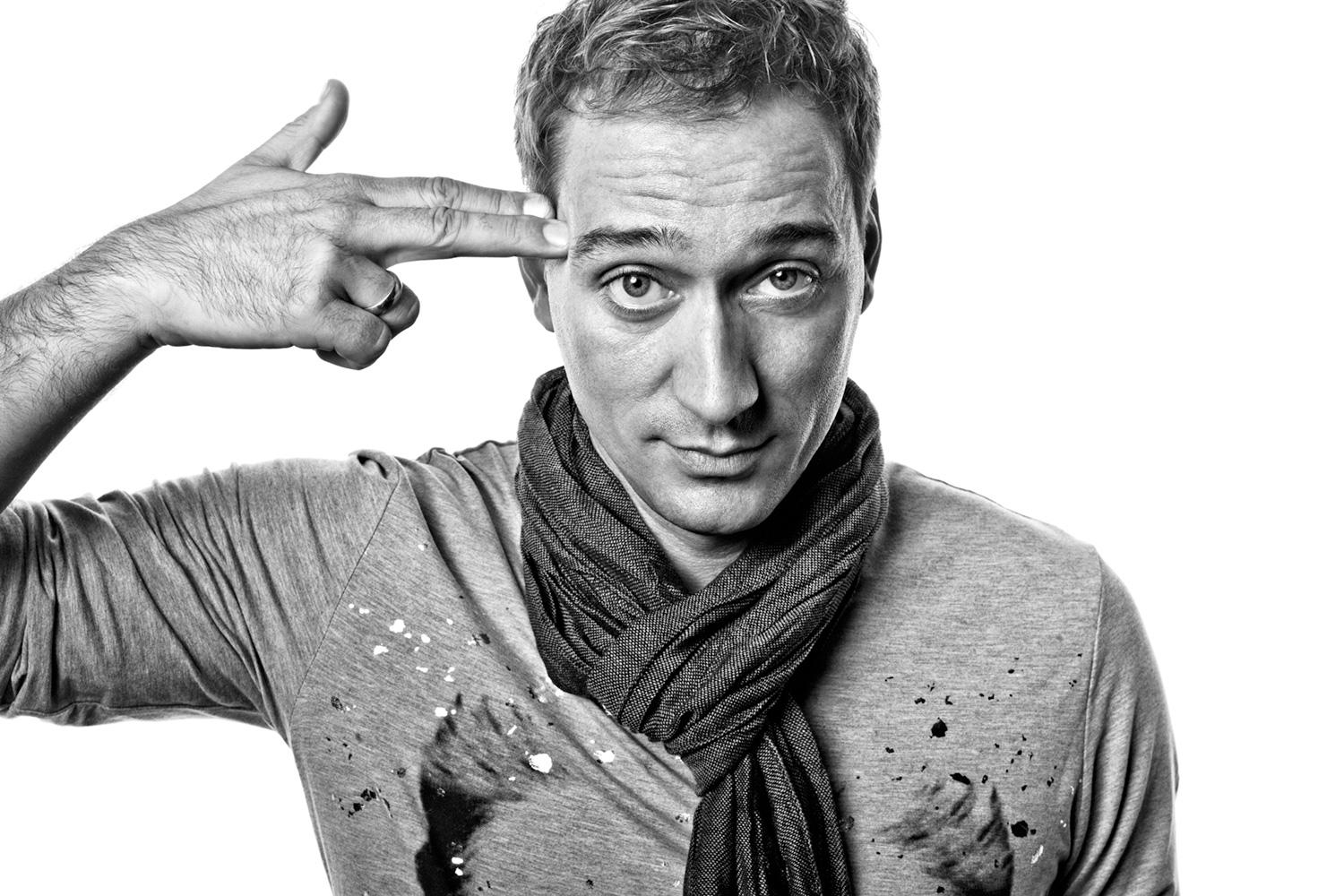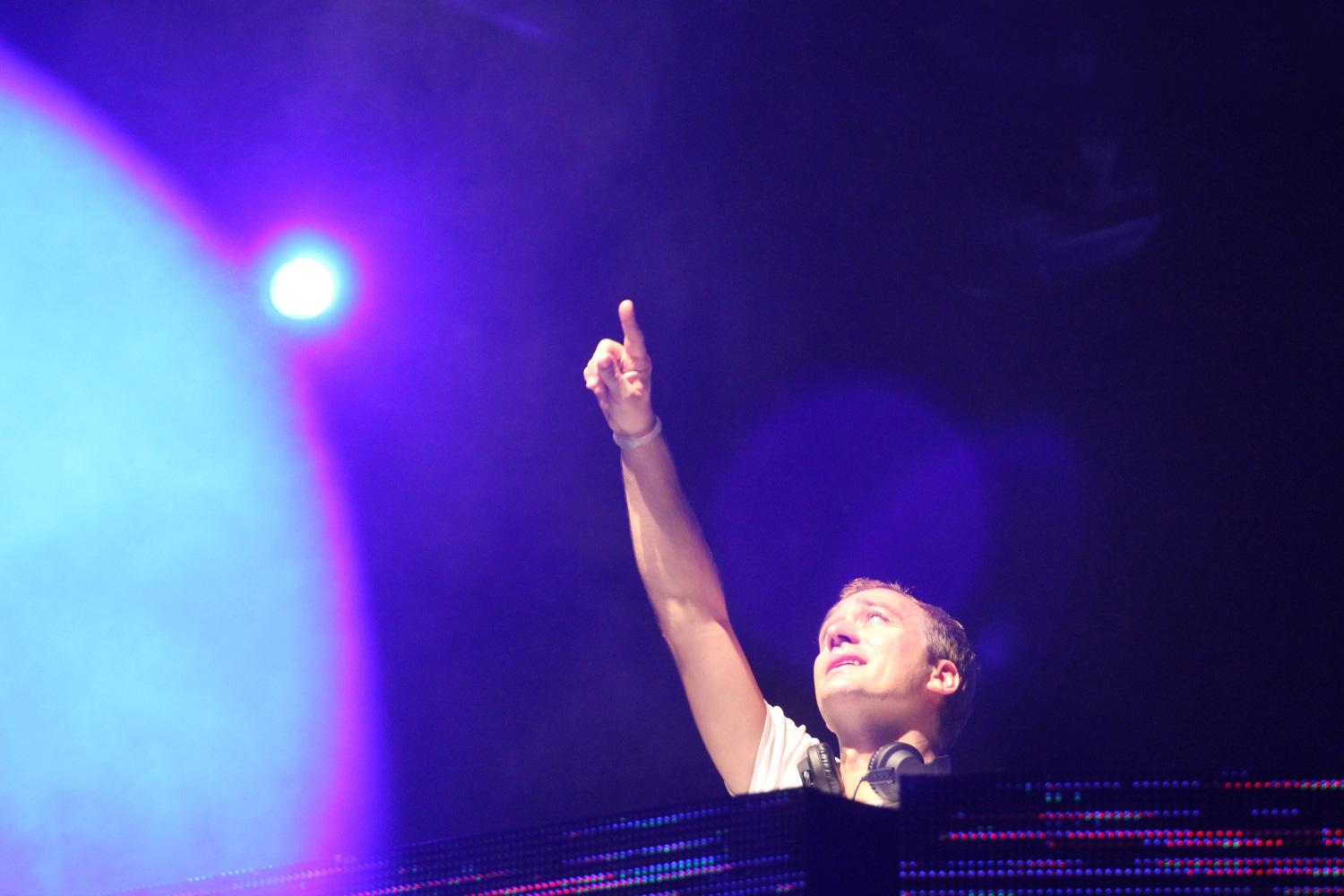
“It’s really hard for me to talk about my music and say what it sounds like. The music itself is my expression.”
To say Paul van Dyk has influenced the course of electronic music over the past two decades would be like saying the sky is blue.
The East German DJ headlines countless clubs and festivals all across the globe year-round, and he continues to push the trance envelope with The Politics of Dancing 3, out now on various formats from Ultra Music. Collaborations with the likes of Mark Eteson and Tricia McTeague on the percussive sizzler Heart Like an Ocean and his own remix of Mino Safy’s pulsating and soundfield-challenging Around the Garden show van Dyk at the peak of his electronic game.
“The collaboration is there to have them shine on the tracks and shine on the production, not just me putting them on there,” van Dyk explains. “It’s all about that freedom. After talking to whoever writes the lyrics, it’s based on the feel and the vibe, and not so much the particular topic.”
During a rare tour break here in the States, van Dyk called Digital Trends to discuss his high-resolution leanings, the current state of electronic music, and how politics still always seems to get in the way of dancing.
Digital Trends: I know you’re into high-resolution and making sure your music is done at 96/24 so we can hear your mixes and creations in the best quality possible.
Paul van Dyk: Yeah, absolutely. That’s what comes out of the machine. The thing is, we have to look at the reality of the way most of the people are listening to music — via their phones or via their iPads. That’s what it is. Still, I’m producing everything in the highest quality possible for the people who actually listen to it in a finer environment.
I can honestly tell you, the most time I listen to music outside of working on it is either in the car, which is not the ideal surrounding, or on the plane with my phone via some headphones. I have good headphones, I have to say — Sony HD7506 professional-grade
I’m proud of the convenience of the MP3, but when you listen to my music as an MP3, especially Heart Like an Ocean on the new album, it seems like two of the bass lines are missing.

Yeah, to me, as an artist, the original composing of the idea is even more important these days. If you listen to some of the most successful tracks on radio now, they sound horrible. It makes you wonder, “How can people not hear that?” But that’s what it is. The overall thing is what needs to be right to me. And I also understand I’m not your average music consumer anyway. (chuckles)
What gear are you currently using? Do you have favorite plug-ins?
Well, I have a Euphonix console, which allows me to play everything out the way I want to, and I have a custom mixer that basically has a lot of digital-to-analog and analog-to-digital converters. Everything comes out on separate channels, and it all gets mixed together. Rather than bouncing things together or randomly putting things together, it’s all properly mastered and recorded as such.
Plug-ins — I think it’s a combination of everything that I have. I couldn’t really say it’s just the one thing. I’m using different things all of the time. At the end of the day, I use what I feel gets my ideas across.
Do you build your ideas from improvisation?
The composing process itself isn’t improvisation the whole way through. Of course, when you play around, there is improvising, but at some point you figure out, “OK, that’s the melody I want to keep.” Then I can go figure out how I want to have it and record it.
You’ve said before that you basically have a recording studio with you onstage, so you’re always prepared to follow any impulses you have.
Yeah, I definitely feel I have a mobile setup onstage to do all sorts of different things. The setup I have with my keyboards, the computers, the controllers, the mixer — everything enables me to do all I can do as one person. Obviously, when I play with my band, it’s a very different approach. But sometimes I would like to have like a third arm. (laughs)
What, you’re not working on cloning yourself at this point? You could be at one end of the stage, literally with you also playing at the other end.
Well, I don’t want people coming to my shows because I look funny. (both laugh) No, I would probably look like one of those weird kind of DJ couples we see these days. No, no, no.
Do you feel there’s enough originality in electronic music these days?
It doesn’t matter what citizenship you have or what god you believe in.
In the media per se, the kind of music that is portrayed as electronic music is not what I consider to be part of the whole electronic music movement. If you look into what electronic music means, you find some really, really awesome producers and DJs who still do everything with the right passion, with the flame in their heart. That’s something that’s still out there. The problem is this whole EDM thing is overshadowing it somewhat — but it’s still there, and it’s still massive.
Who do you feel is doing electronic music the right way?
Well, for example, someone like Jordan Suckley, or someone like Ben Nicky — these are guys who, when you see them play, you feel the passion. And when you hear the production, you feel the passion. That’s what’s so needed for this music. When you listen to a Ben Nicky or a Jordan Suckley production, it just bangs like hell. They know how to do it right.
Agreed. From your point of view as a producer and remixer, how do you construct a track that best shows electronic music in that light?
Um, whew, there are so many great electronic tracks out there. Some things I think sound really cool, and other things aren’t quite right.
It’s a very complex sort of process. It’s not just about the mastering or how you record it — it’s within the recording process. To me, you have to have a basic knowledge about physics. It’s something that’s really important. You have to understand physically how a speaker works. And when you understand this, it makes it almost logical how to engineer how you balance bass lines, bass drums, and these kinds of things. But obviously, not too many people do that.
Another potentially tough question — what do you think makes a Paul van Dyk mix unique?
I don’t know. It is a thing that’s so difficult for me to talk about. People who want a remix of mine, they come to me because they want their composition to sound like I produced it originally. Also, at the same time, I try not to overrun the composition and let the original track breathe as well, despite everything I put on it.
As far as how my music sounds, I’m not really good at putting words to it. Listen to it, and you will understand. It’s about why it is the way it is. It’s like, “Track 1 — I did it because I love it. Track 2 — same.” It’s really hard for me to talk about music like that. The music itself is my expression.
There’s a phrase Van Morrison came up with years ago — the “inarticulate speech of the heart,” which he modified from an old Shavian saying, or something like that. I think that phrase encapsulates how hard it can be to talk about how you come up with sounds.
Yeah. At the end of the day, I’m a musician. That’s what I do. If I would be good at something else, I would write books. (chuckles)
Politics 3 is all about the art of collaboration. Yet the idea of politics itself in the world today doesn’t seem to be about working together at all.
We have to look at the reality of the way most of the people are listening to music.
The reason why I call the series The Politics of Dancing is I want to make a statement that the theme is all of these people are getting together, and it doesn’t matter what citizenship you have or what god you believe in. It’s all about respecting tolerance and having a great time taking this positive energy into your everyday life. It’s a statement I wanted to bring across with a title like that. And if you look at all this conflict these days, if these people would step aside a moment and let go of “you are this color, you are that color” — if they would just accept each other as people, as just persons, the world would be a better place for all of us. The original meaning of The Politics of Dancing is more important than ever.
So true. There are certain conflicts that have literally been going on for centuries over the smallest things, and you wonder if it’s ever going to end, or if it’s even worth it.
It’s difficult sometimes to understand why things like this are happening. You look at where certain conflicts are in Europe — I’ve played in all those places. I’ve played in Kiev. I’ve played in Moscow. I can’t believe that these people are fighting with each other. I thought we’d overcome that nonsense of believing in killing each other makes it a better world. It just doesn’t. I really hope some sense and some intelligence ends up in these conflicts and that they dry out, and people actually become sane again.
Sometimes it doesn’t make any sense. It’s really weird. For example, I’ve just learned that The Politics of Dancing 3 album is not available in the Middle East. It’s not available in the Emirates, or anywhere down there. You know why? Because I work with Israeli artists. This is complete nonsense. So it’s important that music tries to push those boundaries. I didn’t choose these people because of where they’re from. I choose them because they’re people.
All you’re doing is creating music together.
Yeah, but these conflicts, these old, sitting religious grudges — they need to learn to overcome them. Because if there is a God — which, obviously, there’s a lot of argument between many people whether there is or is not — he would most likely want all of us to get along with each other. Why are these guys doing the opposite?
If there is a God, maybe he should be a DJ or musician, because that’s how you bring people together, right?
That may or may not be the vehicle he would use. If there is a God, he would look out at what his creations are doing to themselves. I really think the main issue we have is the imbalance of wealth on one side, and education on the other. Therefore, it creates conflict, and people have the possibility of doing something “in the name of God,” and killing other people. This is something I totally do not believe in.
Sometimes I would like to have like a third arm.
At the end of the day, I can only do the little bit that I can with my music in bringing people together from different cultural backgrounds and have them meet, have them get to know each other, and sort of understand each other. That’s the only thing I can do in the bigger picture, and that’s what I intend to do for a long time. I don’t understand why we’d be divided with any of these things.
Speaking of politics, you grew up in East Germany during the Cold War. What was the first record you got growing up as a kid that had the most impact on you?
The first record that had any impact on me was Hand in Glove, by The Smiths. [Hand in Glove was the first single by The Smiths, released in 1983.] That was the first record I heard on the radio where I went, “Wow, this is awesome! This is so different from everything else!”
Since I grew up in East Germany, the first record I ever got had to be smuggled in by my grandparents — and it was by OMD, Organisation (1980).
That’s a revolutionary album in many ways, considering its drum sounds and collages, and the overall way it sounded.
I always like something that I would say is interesting to listen to, other than the everyday audible blur. I look for something that has meaning, and if you look at what’s going on in the Top 40 radio stations now, it’s all just an audible marketing plan. The marketing plan is the actual method of what there is.
What kind of format were you listening to back then — was it vinyl, or cassette?
It was mostly through radio. We didn’t even have cassettes in East Germany. We listened to the radio, and hoped for something decent to come on.
When were you able to first start buying records on your own — was it after the Berlin Wall came down [in 1989]? Did that also open your ears to different musical ideas?
At the end of the day, I use what I feel gets my ideas across.
Let’s say theoretically when the Wall went down and I lived in the Western part of Germany, it was technically about two years later because I didn’t have any money to buy music. I was a very keen radio listener. My musical education and understanding of what was musically out there was well advanced because I was listening to all of those specialist shows from West Berlin radio stations, so I knew what was going on. But I never knew what the people looked like, and I didn’t speak any English. For me, it was very interesting times to figure out what the lyrics from The Smiths actually said. Still, thinking back, it was a great time.
You didn’t know English when you first started hearing those records? You were just getting them for the beats and the feel? You didn’t have a translation yet?
No, not at all. I was from East Germany; I had to learn Russian. (chuckles) It was like there were no lyrics to me, because I didn’t understand what they were saying.
Was that Smiths song the first one you understood in English?
If you listen to the lyrics of Morrissey, the vocalist of The Smiths, they’re pretty unique, put it this way. I raised some eyebrows to myself — you know, “Holy shit!” when you’re 12 years old, singing that. (chuckles)
Were you inspired to take up an instrument at that point? Did you know you wanted to create music?
When I was a kid, I wanted to learn to play the guitar because I wanted to be like Johnny Marr. But then again, they made me play all these East German children’s songs. I went to class for like six lessons, so my guitar playing is very basic. I’m not really too good with it, but I can play a few chords, no problem.

Everything else I know about making music and composing came much later when the Wall came down and the possibility of actually working in the studio existed.
And you just gravitated toward keyboards rather than guitar because of those experiences?
I transformed from the guitar stuff of The Smiths into the whole world of electronic sounds rather quickly and rather soon, and I really enjoyed that. Therefore, my instrument of choice was keyboard. And my first keyboard was a Roland JX-1 [synthesizer]. There was a lot of music that I made with it.
And now people follow what you’re doing and creating. Did you ever envision as a kid that you would be so influential on an entire scene?
Umm… no! (both laugh) When I started, it really is true that the DJ was the freak in the corner, while everyone else had fun. There was no thing as being famous or making money, or stuff like that — you had to be passionate about it. You had to be a real lover of this music, and there was nothing that you could have achieved with that, really. This was how it was perceived. To me, it was about the music. It was about loving it that much, and bringing things across to people.
When I work on music, I try to bring across the things I want to bring across. And when I feel I have done it, then the track is finished. This is how I work and how I try to achieve the same thing with the same passion and the same drive.
But when I’m in the studio, or making my music, or when I perform, I don’t think about all that. In the moment, I’m thinking about the art, I’m thinking about the music, and most of all, I’m feeling it. And that’s the most important bit of it.








